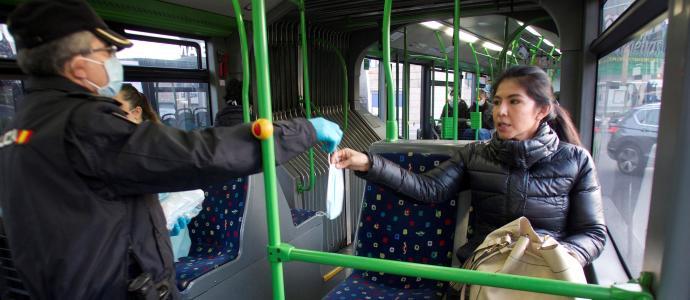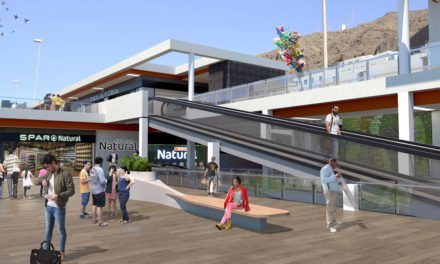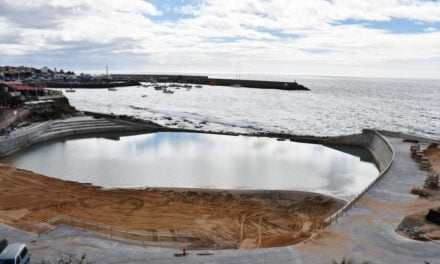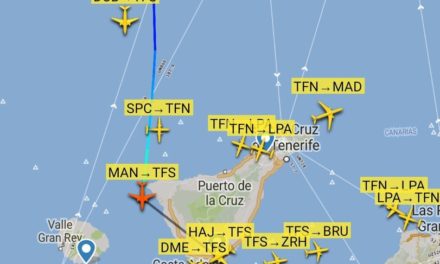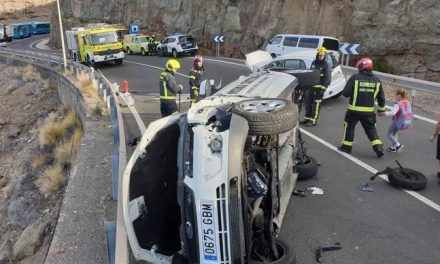Workers in “non-essential activities” have been allowed to resume work this Monday throughout Spain and The Canary Islands, specifically for businesses where it would not be possible to resume work online. Security and protection measures and 10 million masks are being distributed on public transport.
Following the Easter holidays, and the end of the officially recoverable paid leave, from this Monday the situation returns to how things were for the first 15 days of the state of emergency, so that workers from non-essential activities, like construction, can start to return to work, but the preference for all who can to remote work and telework are being maintained, together with all the advised protection and hygiene measures.
The return to work for these non-essential activities workers has started this Easter Monday in all the autonomous communities, except for the eight areas in which it is still officially a holiday (Balearic Islands, Cantabria, Castilla-La Mancha, Valencian Community, Catalonia, La Rioja, Navarra and the Basque Country).
The returning activities
In detail, essential services like health personnel, the State Security Forces and other personnel, the army, security and telecommunications services, customs workers, supply and distribution of food and basic necessities, supply of electrical energy and products will continue, along with those working with derivatives of oil and natural gas.
Other essential services are those of auxiliary companies and industry, components manufacture, cleaning, surveillance and security, maintenance and urgent breakdowns and transport of goods and people, as well as garbage collection and water supply and public transport, are all still subject to restrictions, though able to start functioning once again. In addition, the services linked to the administration of Justice will continue, as well as the media.
Intervention works remain suspended in buildings where people have to work outside the construction, except for specific works and works in buildings to carry out urgent repairs of facilities and breakdowns, as well as surveillance tasks, according to an order published yesterday by the Ministry of Health.
The opening to the public of retail premises and establishments is still prohibited, with the exception of retail commercial establishments for food, beverages, products and basic necessities, pharmaceutical establishments, medical, optical and orthopaedic products, hygiene products, the press, printers and stationery, fuel for the automotive industry, tobacconists, technological and telecommunications equipment, pet food, internet commerce, telephone or correspondence, dry cleaners and laundries. Hairdressers may only maintain home service for dependent persons.
In addition to the educational centres being closed, the opening of hospitality and restaurant activities is still not allowed, except for home services, nor are discotheques, cultural, leisure facilities, sports venues, museums, amusement parks and auditoriums, the celebration of festivals, parades, popular festivals and folkloric demonstrations in open spaces and on public roads.
At the same time, the confinement will continue, workers in Spain are still only able to leave their homes to go to work or provide themselves with essential elements (food and medicine) until at least April 26, although the Prime Minister, Pedro Sánchez, has already announced that it is probable that he will request a new extension of the alarm status, possibly until the second week of May.
Hours recovery
Following the expiration of recoverable paid leave, approved between March 30 and April 9, workers in non-essential activities will be expected to make up the hours of the eight working days not worked, which can be agreed from any day after the end of the state of emergency until December 31, 2020, following negotiation between the company and the legal representation of workers within a maximum of 7 days from the declared end to the national emergency.
Distance and uniform washing
For the return to normality of non-essential activities, the Government has approved a guide of good practices in workplaces, as part of which State Security Forces and similar bodies, Civil Protection volunteers and the Local and regional police will distribute 10 million masks at bus, metro and suburban stations throughout the Spanish towns over the next few days. However, the Government considers that “it is not essential” to wear the mask during the working day if the type of work does not require it and interpersonal distance is maintained.
The guide recommends not going to the workplace if you suspect any adverse symptoms or if there has been “close” contact with anyone who may have been infected, nor should those most vulnerable people due to age, pregnancy or underlying medical conditions, leave their homes, without contacting their doctor to assess their need to continue isolation or not, under guidance issued for labour purposes similar to as if they had suffered an accident at work, which should allow benefits to cover the time economically in the same way as if they had suffered temporary disability.
It is still very much necessary to avoid means of transport that involve grouping together of people and, in the case of using the car or similar vehicle, extreme measures must be continued to prevent more than one person from traveling per row of seats, and to keep the vehicle clean and disinfected before and after travel.
When traveling by bus or train, it is recommended that all passengers keep their interpersonal distance with other travellers and, in the case of public transport, the guide recommends using a hygienic, non-medical mask.
Work uniforms must be bagged, kept separate and transferred to where their usual washing is done, recommending a full cycle wash at a temperature of between 60º and 90ºC.
Hours and capacity
At all workplaces, the Spanish Government recommends planning all operations so that employees can maintain interpersonal distance of at least two meters as well as in common areas too.
For those companies or establishments open to the public, measures must be implemented to minimise contact between workers and the public, such as establishing a maximum capacity, enabling access controls or providing personal protective equipment.
Likewise, when the work space does not allow the maintaining of the recommended interpersonal distance during ordinary shifts, work schedules should be staggered as much as possible, which will also avoid crowds on the transport systems, along with daily tasks of “reinforced” sanitation. Sufficient hygienic and protective materials must be supplied to prevent contagion among workers.
Companies must facilitate teleworking or low-risk working conditions. It is urged that companies do not mix work teams and in the event that this is not possible, maximise hygiene procedures as well as to ventilate the facilities daily and reinforce cleaning tasks in all rooms.
Transport reinforcement
Likewise, the Government is to reinforce the frequency of transport schedules to avoid crowds and the rules of social distancing, approving protocols to avoid crowds at train or bus stations through public address systems or the direct advice of security guards.
The situation now returns to the original ministerial order for Transport on March 24, in which long-distance intercity services were reduced by 70% and in urban areas, each community and town council may establish their own suitable frequencies. In metropolitan areas the transport frequency will be increased during rush hour from Monday and then will remain at 50% for the duration of the day.

